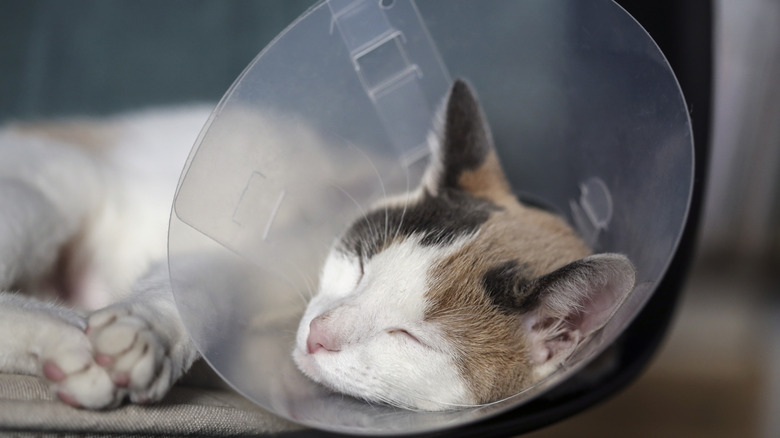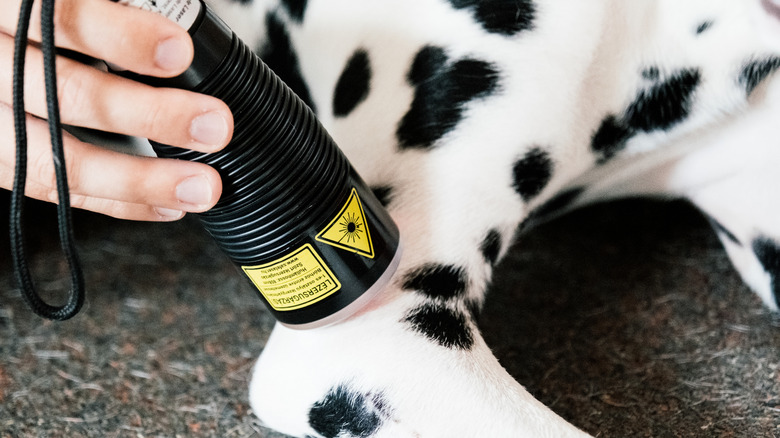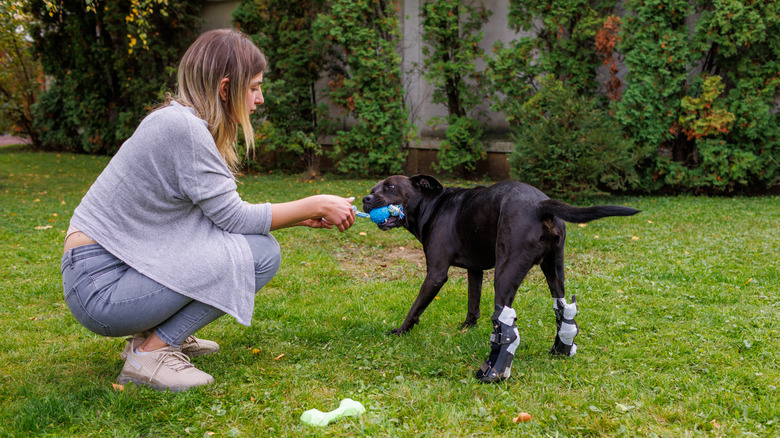Unique Health Devices For Pets (That Aren't The Cone Of Shame)
We may receive a commission on purchases made from links.
Pets sometimes require additional support with medical devices or services to live their best lives. For many pet parents, the Elizabethan collar, more affectionately known as the "cone of shame," or e-collar, is familiar, as most pet parents will have had to use one at some point. A dog's or cat's first cone can be a challenging time as you learn how to help them cope with it, even though seeing them attempting to navigate their temporary coned existence is equally adorable.
However, many other medical devices can also help pets, which are less common but equally important for promoting a happy and healthy life. Medical technology for our furry friends continues to advance, and innovative devices are becoming available to help pet owners treat problems. While some of these medical devices directly support a pet's health, others introduce innovative tools that can be essential for the concerned pet parent.
Cold laser therapy offers an alternative to pain relief
Anyone who has raised a dog to old age or had the heart to discover what it's like to adopt a senior cat can tell you that age and pets come with challenges. Instead of using medication, many veterinarians have begun to opt for cold laser therapy as a safer alternative for older pets suffering from conditions such as arthritis, joint pain, hip dysplasia, and dental inflammation. For pets of all ages, market-available products, such as the KTS Cold Laser, can be used to help soothe common ailments under veterinary supervision.
Cold laser therapy, which uses low-frequency waves to prevent heat buildup, is a non-invasive, drug-free method for helping to heal or reduce pet pain. Cold laser therapy can be the most effective medical tool in a veterinarian's kit, enabling the treatment of pets with low medication tolerance, those with liver disease, and exotic pets where administering medication is particularly challenging.
Pet prosthetics and orthopedics continue to evolve to help keep up their active lifestyles
Mobility devices for pets are not new or unique medical aids, as the industry saw a big wave of innovation at the start of the 21st century. However, ongoing advancements have introduced some new devices that help pets stay mobile. Companies like Bionic Pets customize prosthetics to meet each pet's specific needs, whether it's a full or partial prosthetic for a large or small animal. While most of the prosthetics industry focuses on dogs, the company has made prosthetics for large pets like horses and the smallest ones like guinea pigs.
@usatoday Dymka lost her paws to frostbite but was given a second chance thanks to these all-prosthetic legs. #usatoday #animalsoftiktok
Made famous on the show "The Supervet," Oscar the Bionic Cat became the first feline to receive functioning artificial implants in 2009 after losing his hind legs in an accident. Since then, other cats have gained media attention for their prosthetic recoveries, including Dymka, who, after losing all four legs, found a second life with 3D-printed titanium prosthetics in 2019. Pet prosthetics continue to evolve, and with advances in integrating artificial intelligence into prosthetics for humans, the same care for pets is sure to follow.
Smart pet collars are changing how people monitor their pets' health
Smart collars, such as the Tractive Smart Dog GPS Tracker, do more than just track a pet's movement. These advanced devices also monitor heart rate and can alert owners to excessive barking, indicating stress or a potential intruder. For a pet parent who lets their furry friend spend time outdoors, a GPS tracker can be a vital tool for tracking down an escaped pet, alert owners of potential danger, or notify about a medical emergency.
New smart collars making their way to the market aim to provide even more information for pet owners. Using biosensors and predictive AI, these collars let owners gain deeper insights into potential physical and mental health issues by monitoring a much wider range of potential concerns. Alternatively, smart collars could become essential medical tools for pets with conditions that need ongoing monitoring, such as diabetes, seizures, or chronic kidney disease.
Helmets aren't just for style, as they can be used to protect pets with medical needs
People may have seen dogs sporting helmets going on a heckin' good ride with their owners, with motorcycle and bike companions often wearing protective gear. Yet, the use of helmets includes pets that need head protection for medical reasons. A bumper hat is a medical device used to shield dogs prone to head injuries, which can range from seizures to hydrocephalus, a condition that leaves the brain unprotected by the skull. For home use, headgear like a Happy Hoodie can help a cat or dog deal with anxiety or find relief from ear pain.
Besides the cone of shame, which comes in many shapes and designs, there are many other medical devices that a pet relies on. At the same time, as an ever-evolving industry, pet owners are more likely to encounter technological advances and unique items that help their pets through their toughest times. These tools are all vital in providing beloved furry companions with the long lives they deserve, filled with plenty of love and affection.
Always consult your veterinarian before making changes to your pet's diet, exercise, or care. To find an accredited veterinarian in your area, you can search the American Animal Hospital Association's online database.




